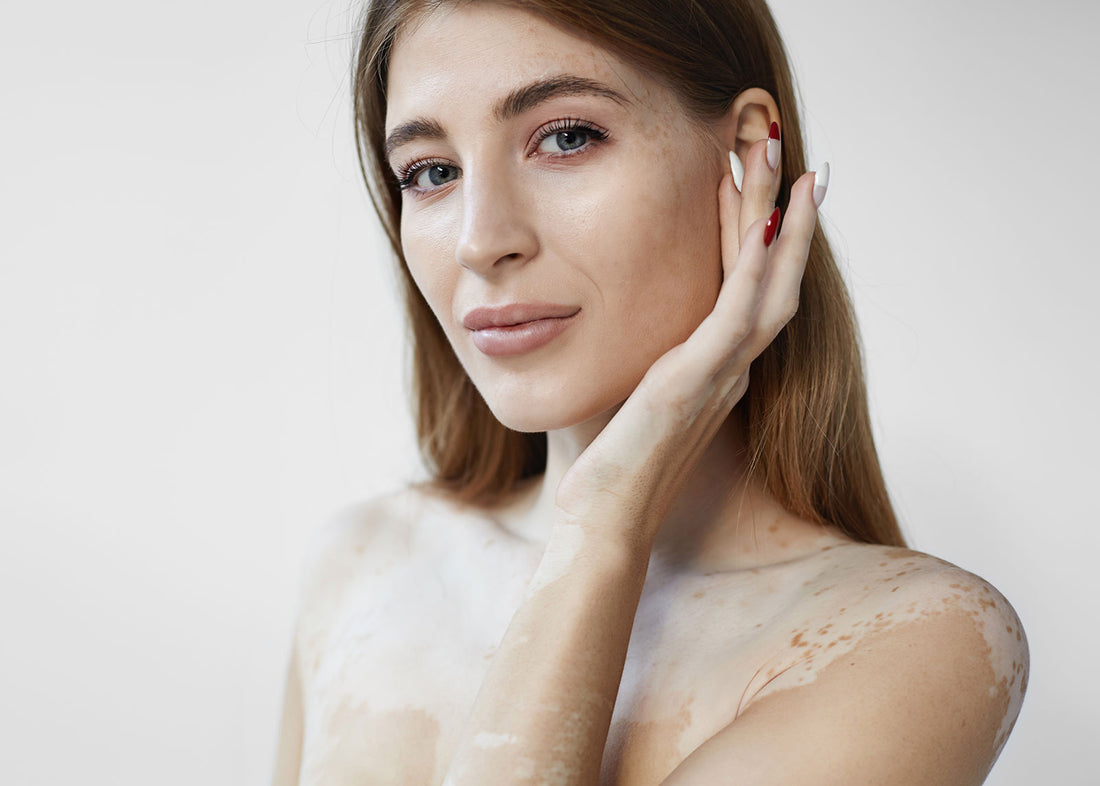The quest for healthy and radiant skin often involves navigating complex skincare concerns. Two common issues that many individuals grapple with are dry skin and dehydrated skin. While these terms are often used interchangeably, they represent distinct conditions with unique causes and characteristics.
Despite their surface similarities, the root causes and treatments of these conditions are distinct. In this article, we will delve into the differences between dry skin vs. dehydrated skin, exploring the underlying factors that contribute to each condition, the visible symptoms they present, and effective treatments. Our All-Body Moisture Retention Crème and Hydrating All-Body Serum will take center stage as holistic solutions, harnessing the power of natural, plant-based ingredients to address the specific needs of dry and dehydrated skin.
Understanding Dry Skin
Dry skin, also known as xerosis cutis, is a common condition that occurs when your skin lacks the necessary amount of moisture or sebum—the oil produced by your body's sebaceous glands. No matter your age or body part, dry skin is a condition that can affect anyone.
The lack of these essential oils in our skin leaves it feeling rough and tight rather than soft. The discomfort can be further amplified with itchiness, flaking, scaling or even cracking in severe cases.
Many factors contribute to dryness; from environmental influences such as harsh weather conditions to hot showers and certain soaps that strip away natural oils. Genetic predisposition and age play a role too.
Considering our All-Body Moisture Retention Crème could be a great move. It's specifically designed to fight dryness, helping you on your journey toward smoother, healthier skin.
Recognizing Symptoms of Dry Skin
What clues and symptoms should one look for? Dry skin often looks dull or lackluster because it lacks the natural oils that give healthy skin its shine. It might feel rough or bumpy to the touch and could even have a tight feeling, especially after showering. These symptoms are more than just uncomfortable—they're your body's signal asking for moisture.
The Telltale Signs
Flaky patches: You may notice small flakes peeling off from your face or body, similar to dandruff but on the rest of your skin.
Rough texture: Your once smooth skin now has a rough texture. That’s another sign pointing towards dryness.
Pulling Sensation Post-Cleansing
Cleanse away grime only to be left with an uncomfortably tight feeling in return? Your cleanser might be too harsh, stripping away essential oils and leaving behind dehydrated cells in need of hydration.
Treating Dry Skin Effectively
When caring for dry skin, the focus should be on restoring and preserving your complexion's natural oils. This isn't as daunting as it might sound. The answer can be found in moisturizers.
Healthline emphasizes that a good moisturizer will not only hydrate your skin but also lock in moisture to prevent further drying out. It’s like giving your thirsty plants a much-needed drink of water – you wouldn’t just splash them with H20; you’d make sure they’re well-watered and have enough sustenance for later too.
The Role of Moisturizers
However, all moisturizers are not created equal. What we need is a top-notch product that can penetrate deep into the skin layers, one that won't evaporate rapidly or leave an oily film.
This is where Trilipiderm’s All-Body Moisture Retention Crème steps into the spotlight. A heavyweight champion when it comes to hydration, this cream helps replenish vital oils naturally present in healthy skin while preventing moisture loss throughout the day - think about keeping that plant quenched all day long.
Unraveling Dehydrated Skin
When trying to figure out if you're dealing with dry skin vs. dehydrated skin, you may be a little confused, as they have similar symptoms. However, dehydrated skin, unlike dry skin, is a condition not dictated by your genes but by external factors. It's all about the water content in your skin cells, leaving your skin looking dull and feeling tight.
The main culprit behind this issue? A lack of hydration from the inside out. If you're not drinking enough fluids or if certain lifestyle habits are drawing moisture away from your body (think alcohol consumption or excessive caffeine), it reflects on your skin too.
External factors play their part as well; harsh weather conditions, heating systems, and air conditioning can strip away vital moisture from the surface of our skin.
Identifying Symptoms of Dehydrated Skin
Are fine lines becoming prominent? Is your face feeling rough after washing? These could be signs that your skin could use extra hydration.
The first sign is typically a sudden onset of tightness in your skin, especially after cleansing or showering. This isn't just your regular post-wash feeling; it's when your face feels super tight. Another common symptom is an unusual increase in sensitivity. Your trusted skincare products might suddenly feel harsher and cause redness or irritation.
A more surprising sign? Increased oiliness. You may be questioning why this occurs when we discuss dehydration—consider it your body's way of attempting to make up for the water shortage by generating an excess of oil.
Dull Complexion & Fine Lines
Moving on from confusing signs, let's talk about those that are hard to miss: dull complexion and accentuated fine lines (Healthline). Dehydration makes our cells shrivel up like raisins which can make the skin look lifeless and lead to premature wrinkles.
Parched Lips & Dark Circles
Last but not least, perpetually parched lips and dark under-eye circles also signal dehydrated skin.
Remember: dehydrated skin needs hydration from within so drink up that water. Next time these symptoms appear remember they could be crying out for more than just a moisturizer. They might need help from our hydrating products too.
Addressing Dehydrated Skin
If you've noticed that your skin often feels tight and looks dull, it might be more than just dry - it could be dehydrated. Never fear, there is hope. You can bring back the glow to your skin with some changes in habits and skincare routine.
The first step is hydration from within. Drink a sufficient amount of water throughout the day. Sounds simple but is often overlooked. Water intake needs vary depending on factors like climate, physical activity level, and individual health conditions.
Finding Your Skincare Ally
A suitable moisturizer will also play a key role in tackling dehydration of the skin because it helps seal moisture into your outermost layer of skin.
This is where our products come into play as they are formulated specifically to help maintain optimal hydration levels in your skin.
Dry Skin vs Dehydrated Skin: A Comparative Analysis
Many people are confused about the differences between dry skin vs. dehydrated skin. But in order to treat these conditions properly, you'll need to understand these differences.
Dry Skin
Dry skin lacks natural oils. Without these essential oils, your skin becomes rough and flaky.
Dehydrated Skin
Dehydrated skin lacks water in the upper layer of skin. This leads to many uncomfortable symptoms, such as itching, dryness, and tightness.
Comparing the Two
In general, dryness refers to a lack of sebum (skin's natural oil), while dehydration means not enough water in the dermis layer. This crucial difference dictates how each condition should be tackled for effective results.
To address dryness effectively, you'll want products designed to restore those missing oils, like Trilipiderm’s All-Body Moisture Retention Crème.
For combating dehydration, our hydrating products are the way to go. They quench your skin's thirst, leaving it supple and radiant.
The bottom line? Whether you're dealing with dry skin vs. dehydrated skin - understanding their unique characteristics can help you choose the right treatment approach.
Conclusion
Understanding the distinctions between dry and dehydrated skin is essential for tailoring an effective skincare routine. Our All-Body Moisture Retention Crème and Hydrating All-Body Serum offer targeted solutions, providing natural, plant-based ingredients that address the unique needs of each condition.
By embracing these specific skincare solutions, individuals can nourish their skin, replenish lost moisture, and cultivate a complexion that radiates health and vitality. Whether you're battling dryness or combating dehydration, our products can be trusted allies in your journey towards skin that feels and looks its best.

